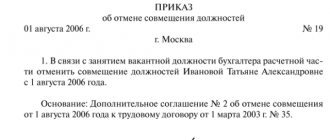In today's difficult financial times, everyone strives to earn more. If the monetary ceiling has already been reached for a position, additional employment may be a solution.
Can this be done officially? How does the Labor Code of the Russian Federation relate to such intentions? What, in such a situation, will happen to the work book, are there any subtleties in the design and restrictions on time and workload? We consider all issues of official employment at several jobs in this article.
Question: An employee has a seven-year-old child. She wrote an application for part-time work. Is the employer obligated to establish a part-time working schedule for an employee if her husband is not officially employed anywhere? View answer
Position of the Labor Code
Russian legislation does not limit the number of possible jobs for a person. But only one of them is considered the main one, and all the rest represent part-time work (Article 282 of the Labor Code of the Russian Federation).
What documents may be required when applying for a job ?
Places of work: main and part-time
The main place of work can be determined on various grounds:
- principle of primacy - the main employer will be the one with whom the employment contract was concluded chronologically earlier;
- the principle of employment - the main workplace forces you to spend more time on it (longer working hours, more days during the week, etc.).
How to hire on an internal or external part-time ?
Differences between the main place of employment:
- an employment contract signed without additional conditions;
- mandatory availability of a work book in the HR department;
- working time is taken into account without including external factors.
Specifics of additional work:
- part-time work must be included in the new employment contract;
- employment must be exclusively during hours or days not spent at the main job;
- you can work in another position with a general superior (internal part-time job) or in another organization (external part-time job);
- working hours occupied by additional services should not exceed 4 hours a day.
FOR YOUR INFORMATION! If you sum up the total working time at all workplaces and divide by their number, the resulting figure should be proportional to the working time determined by law. For example, if a person has two jobs, then the total number of hours spent in each of them should not be more than half the working time by law.
Who can't be a part-time worker?
The law provides for certain categories of employees who cannot hold additional positions as part-time workers:
- young workers under 18 years of age;
- the specific nature of the main production (harmfulness, severity) does not allow applying for additional employment;
- medical indications (prohibitions);
- special situations prescribed in federal legislation.
Read more about the interpretation of working time under the Labor Code in a separate article.
According to Art. 66 of the Labor Code of the Russian Federation. Please explain what “principal place of work” means?
If your employer delays the payment to you upon termination of your employment contract, you have the right to take advantage of the provisions of Articles 84.1, 127, 140, 236, 237, 392 of the Labor Code of the Russian Federation.
Article 84.1. General procedure for registering termination of an employment contract
Termination of an employment contract is formalized by order (instruction) of the employer.
The employee must be familiarized with the order (instruction) of the employer to terminate the employment contract against signature. At the request of the employee, the employer is obliged to provide him with a duly certified copy of the specified order (instruction). In the event that an order (instruction) to terminate an employment contract cannot be brought to the attention of the employee or the employee refuses to familiarize himself with it against signature, a corresponding entry is made on the order (instruction).
The day of termination of the employment contract in all cases is the last day of work of the employee, with the exception of cases where the employee did not actually work, but in accordance with this Code or other federal law, he retained his place of work (position).
Note on the responsibilities of the policyholder (employer):
- issue to the insured person on the day of termination of work a certificate of the amount of earnings for the two calendar years preceding the year of termination of work, see Federal Law of December 29, 2006 N 255-FZ;
- to transmit on the day of dismissal information on accrued and paid insurance contributions for compulsory pension insurance, see Federal Law No. 27-FZ of April 1, 1996.
On the day of termination of the employment contract, the employer is obliged to issue the employee a work book and make payments to him in accordance with Article 140 of this Code. Upon written application by the employee, the employer is also obliged to provide him with duly certified copies of documents related to work.
An entry in the work book about the basis and reason for termination of the employment contract must be made in strict accordance with the wording of this Code or other federal law and with reference to the relevant article, part of the article, paragraph of the article of this Code or other federal law.
If on the day of termination of the employment contract it is impossible to issue a work book to an employee due to his absence or refusal to receive it, the employer is obliged to send the employee a notice of the need to appear for the work book or agree to send it by mail. From the date of sending this notification, the employer is released from liability for the delay in issuing the work book. The employer is also not responsible for the delay in issuing a work book in cases where the last day of work does not coincide with the day of registration of termination of employment relations upon dismissal of an employee on the basis provided for in subparagraph “a” of paragraph 6 of part one of Article 81 or paragraph 4 of part one of Article 83 of this Code, and upon dismissal of a woman whose employment contract was extended until the end of pregnancy in accordance with part two of Article 261 of this Code. Upon written request from an employee who has not received a work book after dismissal, the employer is obliged to issue it no later than three working days from the date of the employee’s application.
Article 127. Exercise of the right to leave upon dismissal of an employee
Upon dismissal, the employee is paid monetary compensation for all unused vacations.
Article 140 of the Labor Code. Payment terms upon dismissal
Upon termination of the employment contract, payment of all amounts due to the employee from the employer is made on the day the employee is dismissed. If the employee did not work on the day of dismissal, then the corresponding amounts must be paid no later than the next day after the dismissed employee submits a request for payment.
In the event of a dispute about the amount of amounts due to the employee upon dismissal, the employer is obliged to pay the amount not disputed by him within the period specified in this article.
Article 236. Financial liability of the employer for delay in payment of wages and other payments due to the employee
If the employer violates the established deadline for payment of wages, vacation pay, dismissal payments and other payments due to the employee, the employer is obliged to pay them with interest (monetary compensation) in the amount of not less than one three hundredth of the refinancing rate of the Central Bank of the Russian Federation in force at that time from unpaid amounts on time for each day of delay starting from the next day after the due date for payment up to and including the day of actual settlement. The amount of monetary compensation paid to an employee may be increased by a collective agreement or employment contract. The obligation to pay the specified monetary compensation arises regardless of the employer’s fault.
Article 237. Compensation for moral damage caused to an employee
Moral damage caused to an employee by unlawful actions or inaction of the employer is compensated to the employee in cash in amounts determined by agreement of the parties to the employment contract.
In the event of a dispute, the fact of causing moral damage to the employee and the amount of compensation for it are determined by the court, regardless of the property damage subject to compensation.
Article 392. Time limits for applying to court for resolution of an individual labor dispute
An employee has the right to go to court to resolve an individual labor dispute within three months from the day he learned or should have learned about a violation of his rights, and in disputes about dismissal - within one month from the date he was given a copy of the dismissal order or the day of issue of the work book.
The employer has the right to go to court in disputes regarding compensation by the employee for damage caused to the employer within one year from the date of discovery of the damage caused.
(as amended by Federal Law No. 90-FZ of June 30, 2006)
If, for good reason, the deadlines established by parts one and two of this article are missed, they may be restored by the court.
A lawyer can explain to you the provisions of all these articles if something is not entirely clear to you, and also advise how you can recover more from the employer for causing moral damage in the event of a violation of the employee’s labor rights by the employer upon dismissal.
Good luck to you.
Questions regarding the work record
A document that takes into account the length of service and positions held is created and stored in the personnel department of the main job.
If a person is employed part-time in one or more positions, he does not need additional work books. Information that a person also works in other places can be entered into his work record at any time.
How to record a part-time job on your employment record
This can be done at the place of any employment at the request of the worker himself (Article 66 of the Labor Code of the Russian Federation). The employee’s desire must be expressed in writing - a statement in which he asks to include information in his documents based on sources confirming additional employment (for example, certificates of service in another company, copies of an order for part-time enrollment, etc.).
The work record will look like this:
- The first column is the next serial number.
- The second column is the date the person was enrolled as a part-time student (based on the documents provided by him).
- The third column - it indicates in what position and in what structural unit or organization the person is listed as a part-time worker (you must indicate the profession and qualifications according to established standards).
- The fourth column indicates the type and number of the supporting document (enrollment order).
NOTE! If a person quits his additional or main job, the entry will have a similar appearance.
Several work books
In the usual sense, a person has one document about his work activity. After all, in the end, information from it will still end up in the same body - the Pension Fund.
However, the law does not prohibit having several work records. Circumstances may vary:
- the primary labor document is lost or damaged;
- it contains information that is unflattering for the employee, which he does not want to advertise;
- the employee does not want to inform the main employer about part-time work (he is not obliged to do this).
IMPORTANT! You will still have to notify the part-time employer, because this condition is included in the employment contract, and the consent of the additional employer is fundamental.
Concealment or loss – what are the dangers?
If an employee does not want information from his employment history to become known at another place of work, he sometimes decides to conceal or destroy the incriminating document.
To prevent this situation from becoming a scam, you need to act in maximum compliance with the law. To do this, you must declare the loss (in writing).
The employer will transmit information about this to the tax authority. For the owner of the book, the accumulated work experience will be taken into account and a new book will be opened. At the same time, you can no longer use the old one - it is illegal.
Additional document
If the main job is a work one, and a person decides to have an additional one for a new job, the law does not object. But the second employer, during official employment, will still report the new employee to the tax service. Therefore, the second book is exclusively an additional hassle for the employee when taking into account the pension experience, since the Pension Fund will have to take into account the combined information of all work books. Owning several employees does not provide any additional preferences.
How to indicate the place of work in an employment contract
It is not allowed to indicate a region that is not included in the company’s area of activity. The format for filling out the column depends on the characteristics of the organization’s activities and the person himself. Alternatively, it could:
- specific address;
- city, locality;
- separate object;
- another country, etc.
The specific wording is chosen by the employer himself, and more often it looks like “Name of the organization. City".
- The concept of the traveling nature of work and its design
Difficulties with registering an item arise if the specifics of the work require frequent travel and being away from the office specified in the organization details. For example, employment of shift workers, construction workers, and repairmen. In such cases, instead of the address of the unit in whose territory the person will work, it is allowed to enter information about the head office, from where the company sends hired personnel for the purpose of conducting economic and commercial activities. For example, when hiring a cashier, it is assumed that he will move within a network of retail outlets owned by the company in a particular locality. Then the usual format indicating one locality is sufficient.
Download: if the work is traveling, Employment contract with a truck driver (sample) (25.5 KiB, 3,032 hits)
Employment contract with the employee. Blank (71.0 KiB, 409 hits)
Employment contract with a bus driver (25.1 KiB, 1,381 hits)
Difficulties in formulation
If a person is employed by an organization that does not have branches or representative offices in the same or different localities, there are no problems with correctly filling out the column in the contract with the employer.
If a legal entity changes its address and location, this entails a mandatory change in the documentation signed when registering hired personnel, since the main clause of the contract – the place of work – changes. If only the address within 1 locality changes, no legal difficulties or consequences arise.
It is more difficult if the activities of the legal entity and obligations under the contract provide for the possibility or need for frequent travel for active actions in the interests of the company far from the head office address.
Large organizations often have several structural divisions scattered throughout the Russian Federation. Working within one locality, an employee may be faced with the need to move to another city or even region. By indicating a specific employment address, the company legally limits its powers in the geography of carrying out assignments, forcing it to resort to business trips.
Separate units
Based on the norms prescribed by Art. 57 of the Labor Code of the Russian Federation, when employed in a separate division or representative office operating away from the head office, the documentation when hiring a person to the staff reflects the specific division and actual location.
Art. 57 Labor Code of the Russian Federation
Thus, the presence of a complex organizational structure obliges the employer to fill out location information in more detail if the branch address belongs to another locality or region. If branches are located in the same area as the main enterprise, they do without specification.
Remote forms
Another problem is related to admission to remote work. The Labor Code contains explanations of what is considered this type of work (Article 312.1). If an employee is hired to perform duties outside the territory of the enterprise, its branches and other structural divisions, if the workplace is not stationary, assuming any other location of the person, while maintaining control over his activities by the company, we are talking about remote work. As a rule, communication, control, and interaction are organized through telecommunication networks, telephone and the Internet.
Although remote work provides relative freedom to choose a location, it is still necessary to include an indication of the regional affiliation of the employee and the personal income tax payer. When hiring a remote employee, the employer adheres to the general requirements for filling out this column - the name and location of the company.
Changing a part-time job to a main job
Sometimes circumstances develop in such a way that additional employment is the main source of income, or the main job for some reason no longer suits you. These types of employment can be swapped or, if the main job is eliminated or a layoff occurs, it can be “converted” into part-time employment.
This requires the will of the person himself and his superiors, since changes to the employment contract can only be made with the consent of the parties (Article 72 of the Labor Code of the Russian Federation).
Options for legal re-registration may vary.
- Translation . Possible if the employee additionally worked internally (in the same organization). A simple transfer to another structural unit is formalized. This method is not suitable if a person quits his main job and wants to convert it into an additional one.
- Additional agreement . Since the terms of the employment contract change, it is legal to conclude an additional agreement on new conditions. To conclude it, you need an order (or instruction) from the new employer to change the employee’s status.
IMPORTANT! When changing job statuses, this information must be reflected in the work book(s).
Is the employee required to report
When hiring a part-time worker, he is not required to confirm with documents that he has a main place of work; the employer can hire him without these documents. Also, the Labor Code and other regulations do not directly oblige a part-time employee to report the termination of the main contract. Therefore, no sanctions can be applied to the employee. However, the employee may be interested in providing this information to his part-time employer in order to make an entry in the work book.
Several full-time jobs – is it permissible by law?
Based on the study of the norms of the Labor Code of the Russian Federation, working under a full-time employment contract in two organizations at once is impossible. If you do this in circumvention of the law, sooner or later the following violations may emerge:
- rules for issuing and maintaining labor documents;
- insurance regulations (pension and medical);
- working time tracking;
- use of false documents;
- accounting irregularities, etc.
Each violation provides for a specific article of the civil labor and tax codes and the corresponding punishment.
Registration of an external part-time worker
What documents are required when applying for a part-time job? Registration of an external part-time job is regulated by Article No. 283 of the Labor Code of the Russian Federation, which defines the following documents when hiring a part-time job:
- passport;
- original or legally certified copy of a diploma of education or advanced training;
- when employed in hazardous production - a certificate confirming the absence of hazardous conditions at the main job.
Since there is no unified application form for admission , it is written in any form addressed to the management of the organization and certified by the personal signature of the person being employed indicating the date the application was written.
Sample application for part-time employment:
The contract must contain:
- designation that the job is part-time;
- Full name of the person being employed and the name of the organization receiving the employee (full name of the employer as a legal entity);
- passport details of both parties;
- date and place of conclusion of this agreement, sealed with personal signatures.
Admission is formalized by an administrative document (order, instruction) on the basis of an agreement. Its form is standard and is determined by the Resolution of the State Statistics Committee of the Russian Federation dated January 5, 2004 No. 1 “On approval of unified forms of primary accounting documentation for labor accounting and its payment.”
The order for hiring part-time work must include the following information::
- start and end date of the contractual relationship;
- Full name of the person being employed;
- structural unit and position;
- salary (allowances);
- probationary period (if any);
- basis (no. and date of the employment contract).
The head of the organization signs the document; the date and number are assigned after the signature. According to the rules, the employee must be familiarized with this order.
Next, you need to make an entry in the work book. But because it is stored in the personnel authority at the main place of work, the part-time worker is given a copy of the order, duly certified.
Sample order for part-time employment:
The employee provides it to his main job and a corresponding entry is already made there.
Part-time work: type of employment agreement or its condition?
Disputes over this issue have been going on for a long time. According to the current Labor Code, part-time work is nothing more than an employee performing other paid work under the terms of an employment agreement drawn up with the employer in his free time from his main job. It’s worth mentioning right away that part-time work can be carried out both at the place of permanent work (internal part-time work) and in third-party organizations (external part-time work).
Internal part-time work is now a fairly common phenomenon. After all, not many employers want to open a new position and hire a new staff member. So it turns out that one employee, in addition to his direct duties, also performs a number of others.
External part-time work is also common. Few can provide themselves with a decent life on one salary received at their main place of work.
If we analyze labor law, it is not possible to give an unambiguous answer as to what part-time work is – a type of contract or one of its conditions. Part-time work is not included in the list of mandatory conditions that must be included in an employment contract. But on the other hand, a separate article contains rules that must be followed when signing part-time employment contracts. That is why the question remains open. Until the basic concepts, norms and rules are approved at the legislative level, the disputes will not subside.
Article 284. Duration of working hours when working part-time
(as amended by Federal Law No. 90-FZ of June 30, 2006)
The duration of working hours when working part-time should not exceed four hours a day. On days when the employee is free from performing work duties at his main place of work, he can work part-time full time (shift). During one month (another accounting period), the duration of working time when working part-time should not exceed half of the monthly standard working time (standard working time for another accounting period) established for the corresponding category of employees.
The restrictions on the duration of working hours when working part-time, established by part one of this article, do not apply in cases where the employee has suspended work at his main place of work in accordance with part two of Article 142 of this Code or has been suspended from work in accordance with parts two or four of Article 73 of this Code.







